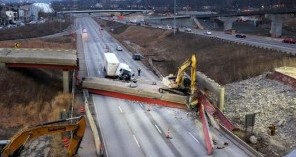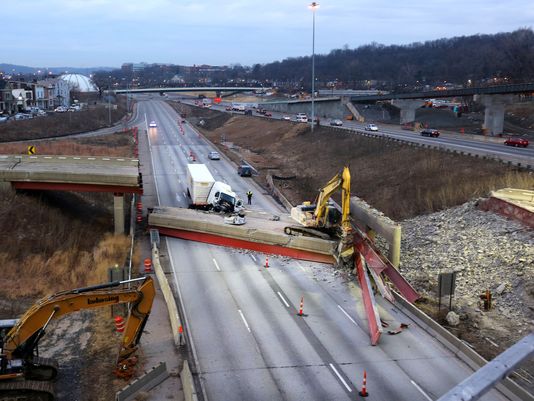As a bridge falls in Cincinnati, the future of federal support remains dicey

Is the bridge collapse in Cincinnati a glimpse of our future? You may have heard that on Monday night, an obsolete overpass undergoing demolition “pancaked” onto I-75, killing a worker and nearly crushing a passing tractor-trailer.
The bridge didn’t fall from decay, per se, but the circumstances in many ways are more worrisome even than that rare occurrence. The 1960s Interstate overpasses and exit ramps in the area are being replaced – at huge cost – because they don’t meet current design standards for safety and function.

The aging Hopwell Bridge collapsed Monday night onto I-75 outside of Cincinnati, killing a construction worker and injuring a trucker.
When you hear the President and others talk about the burgeoning bill for “aging infrastructure”, a lot of it comes down to projects like this, aimed at fixing a local street network for the sake of a key economic corridor like I-75. Here we have a perfect nexus of local needs and costs with huge implications for national commerce, the kinds of investment that simply won’t get done without ongoing, consistent federal support.
So how is that support looking after last night’s State of the Union address? On the plus side, President Obama once again emphasized the need for federal investment, not just for near-term jobs but for the long-term health of a modern, “middle class” economy. He rightfully touted that as a place where there should be substantial, bipartisan agreement on a need to act, and pointed to the Administration’s worthy GROW America Act as a good starting point.
And it is another plus that the urgency of addressing a flailing, soon-to-expire transportation program seems to be breaking out of its insider ghetto into general consciousness in Congress. We’ve probably seen more member comments on reauthorization and salvaging the trust fund this month than in the entire year leading up to the expiration of SAFETEA in 2009.
All that said, the conversation continues to occur in the realm of the abstract. President Obama last night again called for investing an expected windfall from corporate tax reform, and at least some GOP Congress members have expressed similar sentiments. But any such deal is a long way from reality, and at least one key player, Senate Finance Chairman Orrin Hatch (R-UT), has said he’s “basically opposed”. And even if that came to pass, it would be a one-shot infusion, not the long-term, sustainable funding source we desperately need.
Meanwhile, the President extolled the big drop in gas prices as a boon to workers, but declined to suggest that maybe a portion of those savings could be applied to making sure those people can get to and from jobs. While Hatch and other senators have expressed openness to increased gas-tax revenues, Rep. Paul Ryan (R-WI), chairman of the tax-writing House Ways and Means Committee, apparently has expressed adamant opposition.
Meanwhile, as the May 31 expiration date approaches along with spring construction season, transportation agencies are holding off on letting projects, and in some cases cancelling them outright.
Last week, the Missouri DOT released this year’s budget, stating they no longer had the money to maintain the 34,000 miles of state roads and bridges, and will instead only maintain the 8,000 miles classified as “primary,” leaving the other 26,000 “supplementary” roads unmaintained. The Tennessee and Arkansas departments have canceled a number of projects out of uncertainty around federal funding, and many others meeting in D.C. last week said they were contemplating similar actions.
No fewer than 16 state legislatures are currently debating funding measures this session, following on the heels of 12 that have acted in the last two years. But those states are trying to make up a shortfall between needs and resources that exists with the expectation of sustained federal support; none of those states have contemplated making up for reduced or absent federal dollars.
Meanwhile, local communities from Cincinnati to Tampa and from Raleigh to Seattle are struggling to deal with those aging infrastructure issues, or to build for a burgeoning population, or both. They need a reliable federal partner more than ever. The conversation in D.C. needs to get real – real quick.



